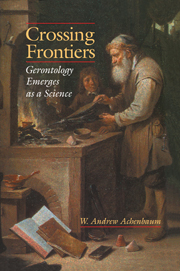Introduction
Published online by Cambridge University Press: 26 March 2010
Summary
Crossing Frontiers argues that gerontology did not emerge as a scientific field of inquiry in the United States until the twentieth century. The field's subject matter – “the study of aging from the broadest perspective” – has deep, variegated roots. Scripture and classical literature attest to the “crown of glory” and other blessings that might be attained by older people. These same sources also describe “days of sorrow” often endured by unfortunate elders who lived too long. Writers from the fourth through nineteenth centuries added to the treasure-trove of positive, negative, ambiguous, ambivalent, and conflicting images of the bio-medico-psycho-social dimensions of the last stage of life. Many “facts” that scientists report in the current gerontology literature correspond to age-old descriptions of old age.
By the same token, gerontologists lately have disclosed other aspects of aging that are truly novel. According to demographers, at least two-thirds of the improvement in human longevity has occurred since 1900. During this century, gains in life expectancy at birth and in adulthood have altered relationships: for the first time in our history, most middle-aged Americans have more living grandparents than children; senior citizens outnumber teenagers. There is an increasing incidence of five-generation families.
Thanks to breakthroughs in biotechnology, we are on the verge of modifying processes of senescence at the cellular level. New medications, sophisticated prosthetic devices, and a better understanding of diet and nutrition have dramatically improved the quality of late life.
- Type
- Chapter
- Information
- Crossing FrontiersGerontology Emerges as a Science, pp. 1 - 20Publisher: Cambridge University PressPrint publication year: 1995



